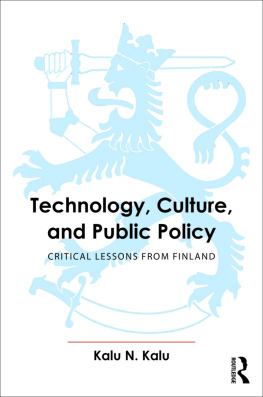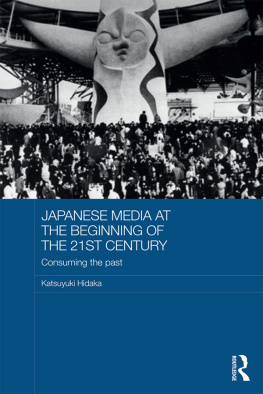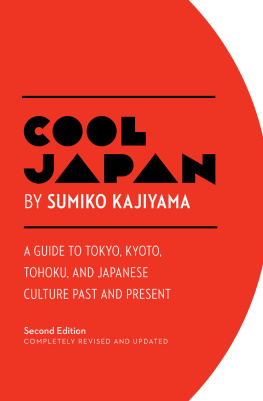Kalu N Kalu - Japanese Media at the Beginning of the 21st Century: Consuming the Past
Here you can read online Kalu N Kalu - Japanese Media at the Beginning of the 21st Century: Consuming the Past full text of the book (entire story) in english for free. Download pdf and epub, get meaning, cover and reviews about this ebook. year: 2016, publisher: Routledge, genre: Politics. Description of the work, (preface) as well as reviews are available. Best literature library LitArk.com created for fans of good reading and offers a wide selection of genres:
Romance novel
Science fiction
Adventure
Detective
Science
History
Home and family
Prose
Art
Politics
Computer
Non-fiction
Religion
Business
Children
Humor
Choose a favorite category and find really read worthwhile books. Enjoy immersion in the world of imagination, feel the emotions of the characters or learn something new for yourself, make an fascinating discovery.
- Book:Japanese Media at the Beginning of the 21st Century: Consuming the Past
- Author:
- Publisher:Routledge
- Genre:
- Year:2016
- Rating:3 / 5
- Favourites:Add to favourites
- Your mark:
- 60
- 1
- 2
- 3
- 4
- 5
Japanese Media at the Beginning of the 21st Century: Consuming the Past: summary, description and annotation
We offer to read an annotation, description, summary or preface (depends on what the author of the book "Japanese Media at the Beginning of the 21st Century: Consuming the Past" wrote himself). If you haven't found the necessary information about the book — write in the comments, we will try to find it.
Kalu N Kalu: author's other books
Who wrote Japanese Media at the Beginning of the 21st Century: Consuming the Past? Find out the surname, the name of the author of the book and a list of all author's works by series.
Japanese Media at the Beginning of the 21st Century: Consuming the Past — read online for free the complete book (whole text) full work
Below is the text of the book, divided by pages. System saving the place of the last page read, allows you to conveniently read the book "Japanese Media at the Beginning of the 21st Century: Consuming the Past" online for free, without having to search again every time where you left off. Put a bookmark, and you can go to the page where you finished reading at any time.
Font size:
Interval:
Bookmark:
by Routledge
711 Third Avenue, New York, NY 10017
2 Park Square, Milton Park, Abingdon, Oxon OX14 4RN
Names: Kalu, Kalu Ndukwe, author.
Title: Technology, culture, and public policy: critical lessons from Finland / by Kalu N. Kalu.
Description: New York: Routledge, 2016. | Includes bibliographical references and index.
Identifiers: LCCN 2016004522 | ISBN 9781482223446 (cloth: alk. paper) | ISBN 9781315563428 (ebook)
Subjects: LCSH: FinlandHistory1981- | Technological innovationsGovernment policyFinland. | FinlandCultural policy. | FinlandEconomic policy. | FinlandSocial policy. | FinlandPolitics and government1981
Classification: LCC DL1140.6 .K35 2016 | DDC 320.6094897dc23
LC record available at http://lccn.loc.gov/2016004522
ISBN: 978-1-315-56342-8 (ebk)
by codeMantra
Elesie Ukanwa Ndukwe Kalu

Font size:
Interval:
Bookmark:
Similar books «Japanese Media at the Beginning of the 21st Century: Consuming the Past»
Look at similar books to Japanese Media at the Beginning of the 21st Century: Consuming the Past. We have selected literature similar in name and meaning in the hope of providing readers with more options to find new, interesting, not yet read works.
Discussion, reviews of the book Japanese Media at the Beginning of the 21st Century: Consuming the Past and just readers' own opinions. Leave your comments, write what you think about the work, its meaning or the main characters. Specify what exactly you liked and what you didn't like, and why you think so.










